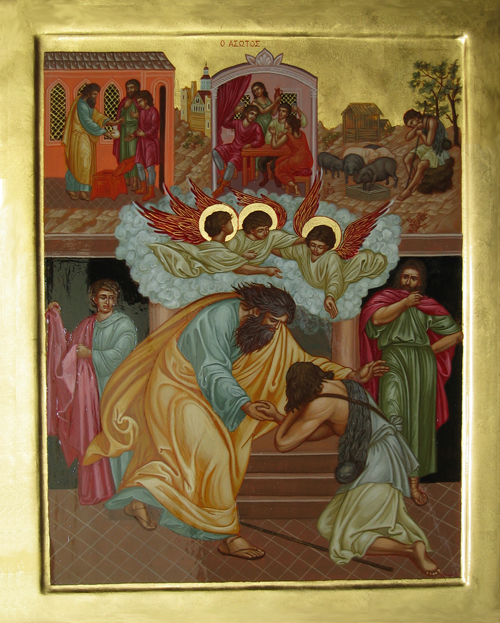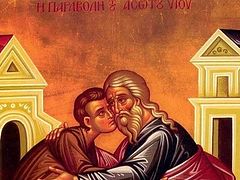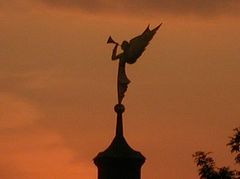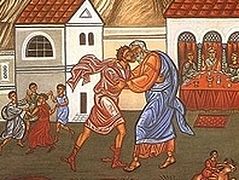All of us are born into this world with a deep and unquenchable longing for Paradise. Many of us are not aware of it. Most of us bury it beneath the mire of our passions; we try to satisfy this pure and holy desire with the trinkets and trivialities of the present world. We become as ships tossed to and fro, as wanderers amid the wasteland of this life, consumed by a gnawing hunger for we know not what. Like tortured inverses of Midas, mocked by fate, every golden and glittering thing which we reach out and grasp turns to dust and refuse in our hands. This primal desire, this fundamental and quintessentially human longing, drives us on unrelentingly onward throughout all of the pain and misery of our lives.
We are exiles. And precisely so: we have been banished, driven out of our ancestral home, barred by a flaming sword from the Tree of Life, condemned to a life of unending suffering and toil for the sake of mere bread, fare more paltry by far than swine’s husks for one who was born to reign over all Creation, to commune with God in the eternal banquet of the Kingdom of Heaven.
Why? If the Lord God is truly the merciful, loving, and all-forgiving Father of Whom we have just heard in today’s Gospel reading, how can He be so vindictive and cruel? Why are His punishments so harsh and unrelenting, far beyond what any of us could be expected to endure?
The answer is simple: it is because our misery is the only thing that can save us. It is precisely because it is more than we can bear.
We call today the Sunday of the Prodigal Son. Yet let us remember that it is not only his story. The parable begins: A certain man had two sons. And though they at first appear to be quite different, in fact they are really very much the same. It seems that neither son truly loved their father. The younger son took his inheritance and left the father’s House, squandering it with riotous living. But though the elder son remained, it turns out that his real desire, the love that made its nest within his heart, was not so different from that of his brother, and he was consumed with bitterness and envy because he was never given so much as a kid to make merry with his friends. He too desired only his inheritance and the pleasures of this life. And though he never left to give himself up to those desires, yet in the end it was he that refused to enter into the joy of his father’s House. It was his heart that remained cold and darkened, and it was he who chose to remain ultimately alone.
This is a very real danger for all of us, especially those of us who live in this holy monastery. We can hide our decay and self-love under the mask of outward obedience. We can wander all throughout the world without leaving these holy walls. And we can far too easily scorn, mock and condemn those who have visibly chosen to reject the Father’s House, and yet all the time be ourselves far more deeply lost than they.
It is sometimes better to be the younger son starving in the pig pen than the elder son who, though outwardly abiding in the Father’s House, does not truly desire to love Him. It is oftentimes easier to “come to ourselves” amidst the misery and emptiness of the world than under a false veneer of piety. For it is only by realizing our wandering that we have any hope of beginning the long road home. It is only by experiencing the tortuous pain that lies beneath the pleasure we have chosen that we can find the path of escape. To taste the bitterness of the world which we ourselves have poisoned is the only medicine which can cure us.
In the words of Abba Dorotheos:
How have we come into all this affliction? How have we fallen into all this misery? Is it not because of our pride? Is it not because of our senselessness? Is it not because we took the wrong decision? Is it not because we chose to impose our bitter will? Why? Was not Man created with every luxury, in all joy, in all rest and in all glory? Was he not in paradise? God said, “Do not do that” but he did it. Do you realize the enormity of his pride? Do you see his obstinacy? Do you see his insubordination? Therefore, when He saw his impudence God said: “He is a fool, he does not know how to be happy. If he does not have a hard time, he will be totally lost. If he does not learn what sorrow is, he will not learn what rest is.” Then He gave him that what he deserved and expelled him from paradise. Thus, Man was given up to self-love and to his own desires which would crush his bones, so as to learn not to trust himself but the commandment of God. The hardships from disobedience will teach him the calmness that comes from obedience as the Prophet says: “Your own wickedness will correct you” (Jer 2:19).
So during the Lenten season ahead—and throughout all our remaining life in this present world—when we see our sinfulness, our brokenness, when we begin to know by bitter experience the tragedy of how drastically we have lost our way, let us not despair. Let us not wonder at it. Let us not ask: “where is the Lord?” He is walking this path of exile beside us. He has been this way before, even down to the lowest depths of Hades. He did not send us here to perish, but to walk with Him the only path that exists to His Father’s House.
To Him be all glory, honor and worship, together with His unoriginate Father and His all-holy and good and life-creating Spirit, now and ever, and unto the ages of ages. Amen.





Not a comment on the words of the article, but a question on the Icon. Do you know who wrote this Icon and where I might be able to buy a copy of it? If you know, please feel free to respond to my email.
Thank you!